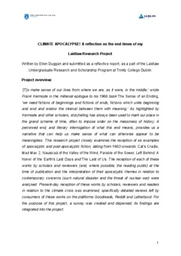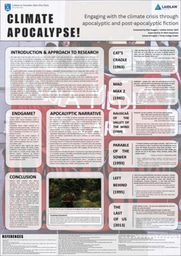Summer 1 Blog Post
Before I submitted my Laidlaw application, I had my friend Nathan do a last-minute read over my research proposal. At the time, Nathan was both doing a masters and applying for a PhD, so I figured that he would be able to highlight any issues of language or content.
I sent him the document via text and waited for him to read it. “Well,” I typed, “what do you think? What needs fixing?”
“Um,” his reply came, “there’s nothing that I can see. But do you think you might be being a bit ambitious? This kind of sounds like a PhD, rather than a six week summer project.”
When I first heard about the Laidlaw program at Trinity, I knew almost instantly that I wanted to apply. Specifically, I knew exactly what I wanted to research: apocalyptic narratives and the climate crisis! They had been twin fascinations of mine from my childhood–at the age of six, I read in a fact book that our solar system’s sun would, in approximately four billion years time, explode. I was horrified. I couldn’t understand why a looming mass extinction event didn’t have everyone in a frenzy of panic on behalf of the future inhabitants of the earth, couldn’t understand why we weren’t urgently trying to create space travel technology that could save us by taking us to some far-away planet where this wasn’t a possibility (at this point in the blog post, it may be clear that I had an early love of science-fiction). It was a year later that I was introduced to the phrase ‘global warming,’ when my name was picked from a hat to become my class Green Schools Representative. You can connect the dots.
Apocalyptic literature is, by and large, the most vast and fascinating subject that I have the privilege to engage with in my time in college. The reasoning and conventions associated with apocalyptic literature undergird the social history of our world, with the genre having had enormous impact on culture, politics and society. Stories of the beginning and the end of the world are maybe as old as stories themselves. Naturally, there is a lot of reading to do.
And here I ran into a problem.
The thing is–I like research. I love research. I love what I study because, if I could do whatever I wanted, this is what I would do. I would read books, books about what people thought about other books, and books about what people thought of the people who wrote books. I am extraordinarily nosey. I like to know everything and I don’t like having an incomplete picture of a topic. I struggle with essays sometimes because, while writing, I am so aware that I don’t know everything that can be said about the topic. And I don’t want to get it wrong, so I go to read some more and then come back to write it and then go away to read some more. And then, I have an eighty-page document of research for a 1,500 word essay about a singular poem from the late twentieth-century.
So you can imagine how I dealt when faced with a genre with several millenia’s worth of commentary, let alone texts.
I’ll admit, I really struggled with this project. The literature was overwhelming. Everyone seems to have, at one point or another, declared the end of the world. If they hadn’t, they’ve probably had something to say about someone else who had declared it. And I have, ultimately, come to the conclusion that I will never know enough. You and I and everyone else in the world can never know or do enough. There is too much to know and too much to do. And what even is enough? Enough is an arbitrary goal that I have never seemed to reach. The goalpost is always moving.
Nathan was right–to want to do a good and thorough job with this research, to come to some definitive conclusion within a summer, was wildly ambitious. There is so much more to be done and so many more papers to read and opinions to contend with. I have not even made a dent in this subject. But even if I had all the time and all the resources in the world, I don’t believe I wouldn’t still feel the same way. In realising that nothing will satisfy me (short of having a go at the Salmon of Knowledge), I have gradually understood that when you care about something, all you do is what you can. What you can do is dependent on circumstance and, quite frankly, often on good fortune (which is, I suppose, circumstance). If you can’t do something, it doesn’t necessarily help to dwell on the mammoth task you are facing forever, nor to dwell on what you see as your shortcomings. You have to contend with the fact that you can’t do enough and instead you must do what you can.
I won't go so far as to say this experience has made me much less of a fanatic when it comes to thorough research–I wasn’t joking about that 80-page document, and I currently have a much, much larger one stacked with quotations and statistics and citations for my research. But it has helped me to understand that, even when it seems insignificant, you can only do what you can.
That being said, I hope I did a reasonably good job.


Please sign in
If you are a registered user on Laidlaw Scholars Network, please sign in
What a well written piece Ellen!
Thank you so much Bhadra!